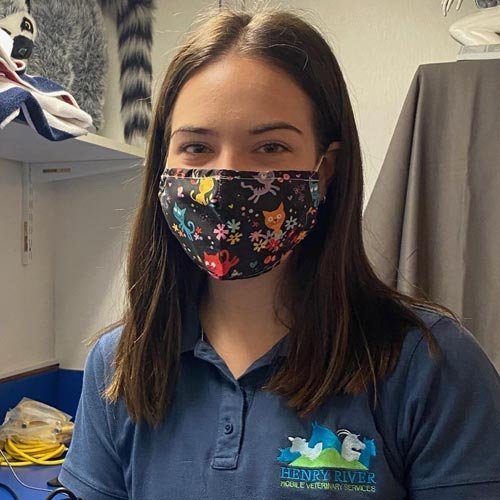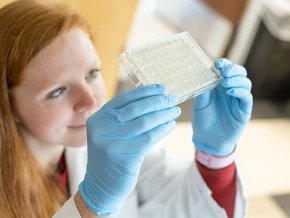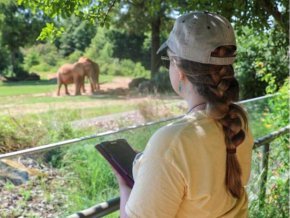Biology, B.S.
Gain a strong foundation in science and hands-on research that prepares you for medical school, graduate study or careers in biology.
As a biology major, the program has high expectations for you that are rewarded with the successes that come to those willing to work hard and commit to their education.
With a degree in biology from LR, you can work in the sciences, health care, education, government, non-profit, research, communications, attend graduate school and much more.
Request Information
Take the next step toward completing your B.A. or B.S. in Biology degree at Lenoir-Rhyne University.
Get StartedTake the next step toward completing your Bachelor of Arts or Bachelor of Science in Biology degree at Lenoir-Rhyne University.
The Bachelor of Science in Biology major acquaints students with information and methods pertinent to a variety of biological areas, as well as selected areas of chemistry, physics and mathematics. Some of the courses include study of genetics, cellular biology, ecology, plant anatomy and physiology, and independent research.
This major prepares qualified students to enter graduate school in the biological sciences as well as medical school, dental school, veterinarian or other professional schools. In addition, biology in conjunction with other academic programs offers a dual-degree program in pre-forestry and pre-environmental management.

I went into general biology because I didn’t know I wanted to be a veterinarian. I knew science was my thing, but this let me tailor my education to my interests.
Learning Outside the Classroom
In addition to extensive laboratory experience through all of your biology courses, there are many opportunities for students to learn and develop skills outside of the classroom. Outdoor classroom activities and field experiences are planned throughout each academic year. Students perform ecological studies at lakes, streams and in the mountains. You can also take an active role in science outreach and in nature preservation on campus.
Student Research
Biology students are required to complete an independent research project — performing all aspects of scientific discovery from data collection and observation to experimentation and evaluation — and present your findings to faculty and peers.
Internships
You may choose to participate in an internship available through area hospitals, laboratories, physician and dental offices, veterinarian clinics, as well as science centers. Work study opportunities are also available on campus, through which you can gain valuable experience serving as lab and/or faculty assistant.
Biology Events
The College of Natural Sciences and Mathematics hosts the Steelman Lecture Series through which renowned scientists and scientific writers are invited to speak to the campus and surrounding community.
Career and graduates school nights are also held annually. These events feature former students and respected professionals in the field who speak with current students, offering information and guidance about various career options.
Major Requirements
The Biology major offers a comprehensive foundation in the life sciences, integrating key concepts and methodologies from biology, chemistry, physics, and mathematics. Students gain broad exposure to the biological sciences while developing critical thinking, quantitative reasoning, and laboratory skills. The Bachelor of Science (B.S.) in Biology is ideal for students planning to pursue advanced study in graduate, medical, dental, or other professional health programs. This rigorous degree includes coursework in physics and requires participation in undergraduate research, providing strong preparation for competitive postgraduate opportunities.
Honors
Students majoring in Biology judged qualified by the faculty may, upon invitation, pursue honors work in Biology. To graduate ''With Honors in Biology,'' students must have a minimum cumulative GPA of 3.0 and a minimum major GPA of 3.2. They must complete BIO 390 and BIO 391 in the junior year and BIO 498 and BIO 499 in the senior year with a minimum grade of ''B'' in each course. In addition, they must present the research at a seminar before the Biology faculty. BIO 390, BIO 391, BIO 498 , and BIO 499 may count for BIO 400 and 4hrs of general elective for the B.S. degree.
-
General Education Requirements (37 hours)
Graduation Requirements (4 hours)
-
Technical Requirements (27-28 hours)
- CHE 103 - General Chemistry and Qualitative Analysis I
- CHE 103L - General Chemistry and Qualitative Analysis Laboratory I
- CHE 104 - General Chemistry and Qualitative Analysis II
- CHE 104L - General Chemistry and Qualitative Analysis Laboratory II
- CHE 201 - Organic Chemistry
- CHE 201L - Organic Chemistry Laboratory
- CHE 202 - Organic Chemistry
- CHE 202L - Organic Chemistry Laboratory
- Additional MAT elective beyond course taken for general education requirement Hours: 3-4
- PHY 121 - General Physics I
- PHY 122 - General Physics II
-
Major Requirements (37 hours)
- BIO 121 - Principles of Biology I
- BIO 122 - Principles of Biology II
- BIO 200 - Biology Seminar
- BIO 240 - Cell Biology
- BIO 245 - Plant Anatomy and Physiology
- BIO 305 - Genetics
- BIO 310 - General Ecology
- BIO 400 - Research Problems
- or
- BIO 391 - Honors Tutorial (and)
- BIO 499 - Senior Honors Thesis
Major Electives (8 hours)
BIO electives (excluding BIO 110, BIO 220, BIO 281, BIO 282, BIO 471-BIO 473) Hours: 8
- Other Requirements
-
General Elective Credits
General Electives (14-15 hours) as needed to reach 120 hours overall.
-
Total Credit Hours - Minimum 120 hours
On occasion, technical and/or program requirements may also meet specific General Education requirements. Please confer with your program advisor to determine which courses, if any, may be counted accordingly.
All bachelor's degree programs at Lenoir-Rhyne require at least 120 credit hours. If, in combination, General Education, technical, and program requirements do not generate at least 120 hours, additional credits must be completed to achieve 120 hours. These classes may be general electives, or a student may complete a minor or additional major.
News & Events

Lenoir-Rhyne students have the unique opportunity to choose and control their own research projects with the help of dedicated faculty members.
View More
Throneburg is tasked with collecting observational data on Louie the elephant to develop the NC Zoo's understanding of his daily behaviors. She is also tasked with recording interactions between Louie and the zoo's four females — Rafiki, Nekhanda, Tonga and Batir — as they integrate into a herd.
View More